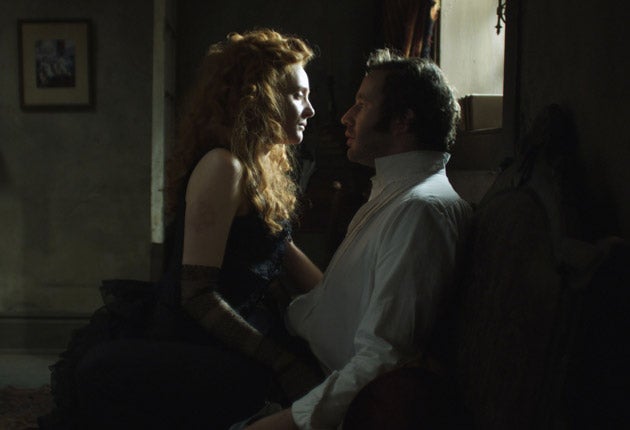The Crimson Petal and the White, BBC2, Wednesday<br/>Campus, Channel 4, Tuesday
This post-Dickensian saga will surely be a hit, but the creator of 'Green Wing' flunks her next exam

Your support helps us to tell the story
From reproductive rights to climate change to Big Tech, The Independent is on the ground when the story is developing. Whether it's investigating the financials of Elon Musk's pro-Trump PAC or producing our latest documentary, 'The A Word', which shines a light on the American women fighting for reproductive rights, we know how important it is to parse out the facts from the messaging.
At such a critical moment in US history, we need reporters on the ground. Your donation allows us to keep sending journalists to speak to both sides of the story.
The Independent is trusted by Americans across the entire political spectrum. And unlike many other quality news outlets, we choose not to lock Americans out of our reporting and analysis with paywalls. We believe quality journalism should be available to everyone, paid for by those who can afford it.
Your support makes all the difference.'Keep your wits about you, this city is vast and intricate... you are an alien from another time and place altogether." We're in London, 1874, and our narrator, Sugar, is inviting us on a tour of her stamping ground. Keeping your wits, though?
This sensitive soul is just trying to keep his dinner about him. As we tumble in and out of doors, up and down stairs, a cavalcade of squalor – dead-eyed urchins, bloodied horses, the Lucian Freud-esque spectacle of a morbidly obese wench splayed naked across a bed – is made queasier by camerabatics.
So it is we're flung down the rabbit hole into this four-part adaptation of The Crimson Petal and the White, Michel Faber's 2002 post-Dickensian saga: a tale of a wily prostitute and her number-one client, it does nothing if not soil the cliché of the cosy costume drama. On the one hand, there's the physical filth of the capital's streets. On the other, the moral stink of our protagonist William Rackham: a failed writer cum feckless perfume-empire scion with a well-developed nose for parental handouts. Oh, and a husband who reacts to his wife Agnes's impending mental collapse by pilfering her jewellery to pay for some solicited solace. What a piece of work is a gentleman, indeed.
Sugar, for her part, isn't about to let a lucrative infatuation go to waste. "What's in a name?" she purrs, just before William's mid-orgasmic revelation of his lineage makes him smell twice as sweet. Sweet enough, indeed, for her to install herself as his commercial muse, cajoling him to apply his "unquenchable curiosity" to the family business, while lying back (or bending over, rather) and thinking of the imminent cheques. Just your classic boy meets girl, boy pays girl, boy and girl engage in mutual exploitation tale, then. Suffice to say, with Sugar scribbling down murderous fantasies and Agnes enjoying visions of angels, none of this will come up smelling of rose-water.
The producers may come up smelling of bonuses, though, for this is surely a hit in the making: a gripping, gritty phantasmagoria that goes to town on the lie of Victorian morality while resisting the corollary urge to lapse into camp. Sweaty and dehumanised, the sex is played for revulsion, not raciness, while, from tricksy beginnings, Marc Munden's direction simmers down to a far more sinister pitch, all subtly off-kilter framing and hazily-shifting focus. Equally, though supporting players such as Gillian Anderson as a viperous madam go heavy on the ham, the leads play it admirably straight. The IT Crowd's lovable slacker Chris O'Dowd, especially, is pusillanimous perfection, his enervated demeanour and strange fluting voice giving the lie to a soul crushed by affectation.
And yet a drama so apparently intent on truth-telling doesn't entirely avoid conjuring its own soft-pedalled fantasies. Sugar, after all, seems as out of place in her depraved surroundings as little Oliver Twist: effortlessly poised, exceptionally well-read, and, as played by everyone's favourite English rose Romola Garai, preternaturally fresh-faced. Not a tart with a heart at least – unless you factor in a sliver of ice – but predictably idealised nonetheless. "Who knows more than me about the connection between commerce and art?" asks Sugar at one point, though you don't doubt her creators know it just as well.
Commerce, Art, Humour, Humanity: all abstracts which Campus assiduously avoids in its mission to become the year's most surprising televisual misfire. Surprising, because this series set around the infantile faculty of a red-brick uni is the baby of Victoria Pile, the creator of the joyous hospital sitcom Green Wing. More surprising, still, because it pretty much replicates its predecessor's entire comedic set-up, from the general mood of institutional chaos to the surreal inter-scene interludes and the central, love-hate flirtation between a scatty neurotic and a smug wannabe lothario.
So where did it go wrong? Probably when Pile became possessed by the spirit of a 16-year-old Frankie Boyle acolyte. For where in Green Wing the sardonicism was lightly sprinkled, this slimes you with an industrial-sized vat of bile. In last week's opener, jokes, in no memorable order, involved: disabled people with "mongy" faces, the word vagina, foreigners talking funny, the word vagina, desperate fat women, women wearing no pants, and the word vagina. That many of these emanated, under the cloak of irony, from as blatant a David Brent rip-off as Andy Nyman's Vice Chancellor only added insult to injury. Might it improve? For many viewers, I suspect, that question is entirely academic.
Join our commenting forum
Join thought-provoking conversations, follow other Independent readers and see their replies
0Comments